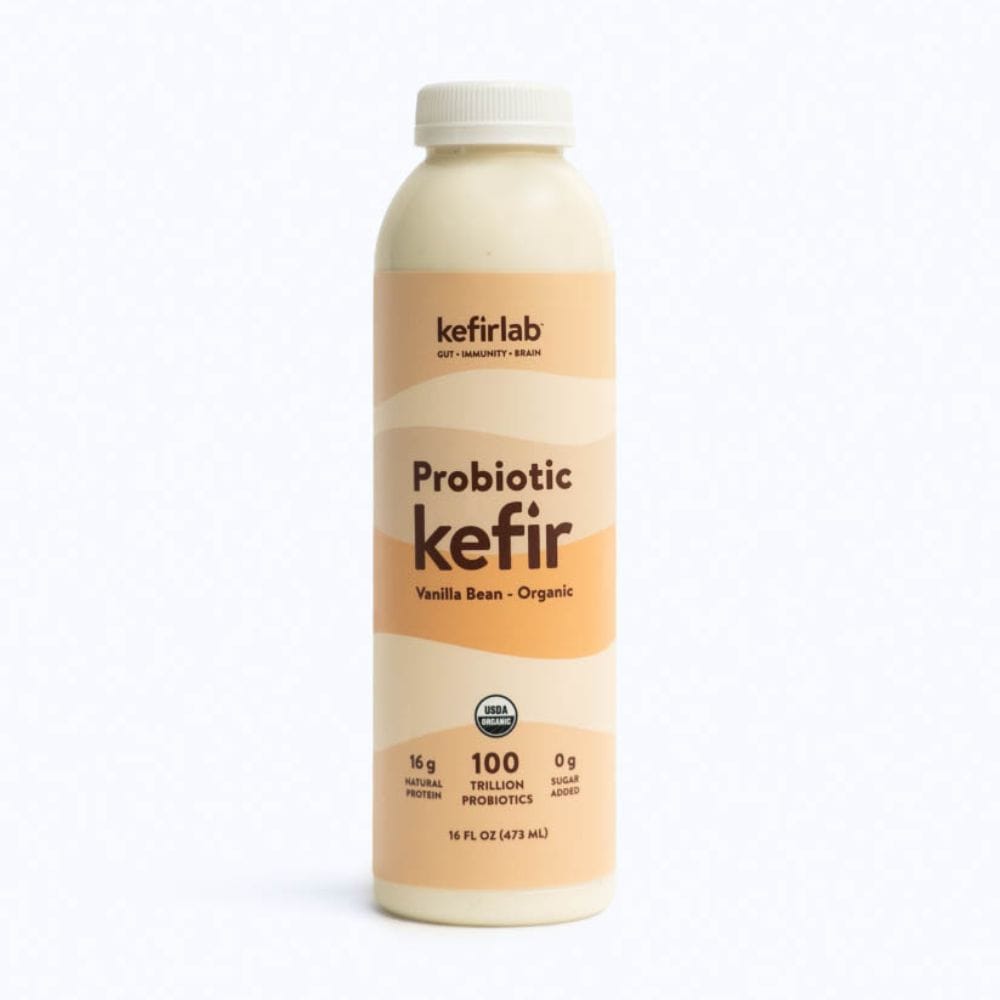Key Takeaways:
- Kefir is a fermented milk drink rich in probiotic bacteria that significantly benefits gut health.
- Drinking kefir can aid in lactose digestion, making it suitable for those with lactose intolerance.
- Consuming kefir regularly can improve overall digestive health and support the immune system.
Introduction to Kefir and Gut Health
Kefir, a fermented milk drink, has been gaining popularity due to its numerous health benefits, particularly for gut health. This tangy, sour drink is packed with probiotic bacteria, which play a crucial role in maintaining a healthy digestive tract. But what does kefir do for the gut exactly? This review delves into the various ways drinking kefir can enhance gut health and overall well-being.
How We Choose
Our team has spent hours researching through thousands of user reviews and star ratings for the best health products on the market. We take into account factors such as taste, nutrition, ingredients, sustainability, and affordability when recommending products to our readers. We strive to find the best options that meet everyone’s needs - even those on a budget!
We hope this may be your next special item! This product was independently selected by our editors. Good Guru Reviews may collect a share of sales or other compensation from the links on this page if you decide to buy something (at no additional cost to you, that's how we stay in business). As always, enjoy finding your next special item with us!

The Fermentation Process of Kefir
The fermentation process of kefir involves adding kefir grains to fresh milk. These grains are a combination of bacteria and yeast that ferment the milk, producing a probiotic-rich beverage. The fermentation process not only enhances the nutritional value of the milk but also creates beneficial bacteria that support gut health.
Kefir grains can be used to ferment different types of milk, including cow's milk, goat's milk, and even non-dairy alternatives like coconut milk. The result is a versatile fermented drink that can be enjoyed by people with various dietary preferences and restrictions.
Probiotic Bacteria in Kefir
One of the primary health benefits of kefir is its high content of probiotic bacteria. These beneficial bacteria help maintain a balanced gut microbiota, which is essential for proper digestion and overall health. Probiotic bacteria in kefir include lactic acid bacteria and acetic acid bacteria, both of which contribute to a healthy gut environment.
Consuming kefir regularly can help replenish the good bacteria in the gut, which may be depleted due to factors like poor diet, stress, and antibiotic use. This can lead to improved digestion, better nutrient absorption, and a stronger immune system.

Kefir and Lactose Intolerance
Many people with lactose intolerance find it difficult to digest traditional dairy products. However, kefir is different. The fermentation process breaks down lactose, the sugar found in milk, making it easier to digest. This means that even those who are lactose intolerant can enjoy the health benefits of kefir without experiencing discomfort.
Drinking kefir can also help improve lactose digestion over time. The probiotic bacteria in kefir produce lactase, the enzyme needed to break down lactose. Regular consumption of kefir can increase the body's ability to digest lactose, reducing symptoms of lactose intolerance.

Kefir and Gut Microbiota
The gut microbiota is a complex community of microorganisms that live in the digestive tract. A healthy gut microbiota is essential for proper digestion, nutrient absorption, and immune function. Kefir, with its rich content of probiotic bacteria, can help maintain a balanced gut microbiota.
Consuming kefir regularly can promote the growth of beneficial bacteria in the gut while inhibiting the growth of harmful bacteria. This balance is crucial for preventing digestive issues like bloating, gas, and constipation, and for supporting overall gut health.
Kefir and Immune System Support
A healthy gut is closely linked to a strong immune system. The probiotic bacteria in kefir can help boost the immune system by promoting a balanced gut microbiota. This, in turn, can enhance the body's ability to fight off infections and illnesses.
Drinking kefir regularly can also help reduce inflammation in the gut, which is associated with various chronic diseases. By supporting a healthy gut environment, kefir can contribute to overall immune system health and resilience.

Kefir and Digestive Health
Kefir is known for its positive effects on digestive health. The probiotic bacteria in kefir can help improve digestion by breaking down food more efficiently and promoting the absorption of nutrients. This can lead to better overall health and well-being.
Consuming kefir can also help alleviate common digestive issues like bloating, gas, and constipation. The beneficial bacteria in kefir can help regulate bowel movements and promote a healthy digestive tract.
Kefir and Inflammatory Bowel Disease
Inflammatory bowel disease (IBD) is a chronic condition that affects the digestive tract. Research suggests that the probiotic bacteria in kefir can help reduce inflammation and improve symptoms of IBD. Drinking kefir regularly may help manage the condition and improve the quality of life for those affected.
The anti-inflammatory properties of kefir can also benefit individuals with other inflammatory conditions, such as irritable bowel syndrome (IBS). By promoting a healthy gut environment, kefir can help reduce inflammation and support overall digestive health.

Kefir and Bone Health
Kefir is a good source of calcium, which is essential for maintaining healthy bones. Adequate calcium intake is crucial for preventing osteoporosis and other bone-related conditions. Drinking kefir regularly can help ensure that the body gets enough calcium to support strong, healthy bones.
In addition to calcium, kefir also contains other nutrients that are important for bone health, such as vitamin K2. This vitamin helps regulate calcium metabolism and supports bone density, further contributing to overall bone health.
Kefir and Blood Sugar Control
Managing blood sugar levels is important for overall health, especially for individuals with diabetes or insulin resistance. Research suggests that consuming kefir can help regulate blood sugar levels and improve insulin sensitivity. This can be beneficial for managing diabetes and reducing the risk of developing metabolic syndrome.
The probiotic bacteria in kefir can also help improve gut health, which is closely linked to blood sugar control. A healthy gut microbiota can enhance the body's ability to regulate blood sugar levels and support overall metabolic health.

Kefir and Blood Pressure
High blood pressure is a common health issue that can lead to serious complications if left unmanaged. Drinking kefir regularly may help lower blood pressure and support cardiovascular health. The probiotic bacteria in kefir can help improve blood vessel function and reduce inflammation, both of which are important for maintaining healthy blood pressure levels.
In addition to its probiotic content, kefir also contains bioactive peptides that have been shown to have antihypertensive effects. These peptides can help relax blood vessels and improve blood flow, further contributing to healthy blood pressure levels.

Kefir and Weight Management
Maintaining a healthy weight is important for overall health and well-being. Kefir can be a valuable addition to a weight management plan due to its high protein content and low-calorie count. Drinking kefir can help promote feelings of fullness and reduce appetite, making it easier to manage portion sizes and avoid overeating.
The probiotic bacteria in kefir can also support weight management by promoting a healthy gut microbiota. A balanced gut microbiota is associated with better metabolic health and a lower risk of obesity.
Kefir and Skin Health
The health of the gut is closely linked to the health of the skin. Consuming kefir can help improve skin health by promoting a balanced gut microbiota and reducing inflammation. This can lead to clearer, healthier skin and a reduction in common skin issues like acne and eczema.
The probiotic bacteria in kefir can also help strengthen the skin's natural barrier, protecting it from environmental damage and promoting overall skin health. Drinking kefir regularly can contribute to a healthy, glowing complexion.
Kefir and Mental Health
The gut-brain connection is a well-established concept that highlights the link between gut health and mental health. Consuming kefir can help support mental health by promoting a balanced gut microbiota and reducing inflammation. This can lead to improved mood, reduced anxiety, and better overall mental well-being.
The probiotic bacteria in kefir can also help produce neurotransmitters like serotonin, which play a crucial role in regulating mood and mental health. Drinking kefir regularly can contribute to a healthier, happier mind.
Kefir and Allergies
Allergies are a common health issue that can cause a range of symptoms, from mild discomfort to severe reactions. Research suggests that consuming kefir can help reduce the severity of allergic reactions by promoting a balanced immune system. The probiotic bacteria in kefir can help regulate the immune response and reduce inflammation, which can alleviate allergy symptoms.
Drinking kefir regularly can also help improve overall immune function, making the body more resilient to allergens and reducing the risk of developing allergies.
Kefir and Detoxification
The body is constantly exposed to toxins from the environment, food, and other sources. Consuming kefir can help support the body's natural detoxification processes by promoting healthy gut microbiota and improving liver function. The probiotic bacteria in kefir can help break down and eliminate toxins, reducing the burden on the liver and supporting overall detoxification.
Drinking kefir regularly can also help improve digestion and nutrient absorption, which are important for maintaining a healthy detoxification system. A healthy gut can enhance the body's ability to eliminate toxins and support overall health.
Kefir and Nutritional Value
Kefir is a nutrient-dense beverage that provides a range of essential vitamins and minerals. In addition to its probiotic content, kefir is a good source of protein, calcium, vitamin D, and B vitamins. Drinking kefir regularly can help ensure that the body gets the nutrients it needs to support overall health and well-being.
The fermentation process also enhances the bioavailability of nutrients in kefir, making them easier for the body to absorb and utilize. This can lead to better overall nutrition and improved health outcomes.
Kefir and Lactose Digestion
For those who are lactose intolerant, consuming kefir can be a game-changer. The fermentation process breaks down lactose, making it easier to digest. This means that even individuals who typically struggle with lactose digestion can enjoy the benefits of kefir without experiencing discomfort.
Drinking kefir regularly can also help improve the body's ability to digest lactose over time. The probiotic bacteria in kefir produce lactase, the enzyme needed to break down lactose, which can enhance lactose digestion and reduce symptoms of lactose intolerance.

With doctor developed formula and Italian taste craftsmanship, their Vanilla Bean Kefir gives your biome everything it could ask for.
It got the market’s highest 100 trillion CFU with a smooth rich finish and slight notes of vanilla.
Summary
Kefir is a powerful fermented milk drink that offers numerous health benefits, particularly for gut health. Its high content of probiotic bacteria can help maintain a balanced gut microbiota, improve digestion, and support the immune system. Drinking kefir regularly can also aid in lactose digestion, making it suitable for those with lactose intolerance. Additionally, kefir can support bone health, blood sugar control, weight management, skin health, mental health, and more. By incorporating kefir into your daily diet, you can enjoy these health benefits and support overall well-being.
As always, consult with your physician before starting any new supplement regimen to check about potential interactions with other supplements or medications. The information presented in this document is purely for educational purposes and should not be construed as medical advice.
While every effort has been made to ensure the accuracy and reliability of the information provided, all health-related decisions should be made in consultation with a qualified healthcare professional. The author does not take any liability for the health decisions made by the reader.
FAQ
Can lactose-intolerant individuals drink kefir?
Yes, lactose-intolerant individuals can drink milk kefir fermented foods. The fermentation process breaks down lactose, making it easier to digest. Regular consumption of kefir can also improve lactose digestion over time.
How often should I drink kefir to see health benefits?
To see health benefits, it is recommended to drink kefir regularly, ideally daily. Consistency is key to maintaining a healthy gut microbiota and reaping the full benefits of kefir fermented dairy products.
Can kefir help with weight management?
Yes, kefir can help with weight management. Its high protein content and low-calorie count can promote feelings of fullness and reduce appetite. The probiotic bacteria in kefir probiotic fermented milk can also support a healthy gut microbiota, which is associated with better metabolic health and a lower risk of obesity.










